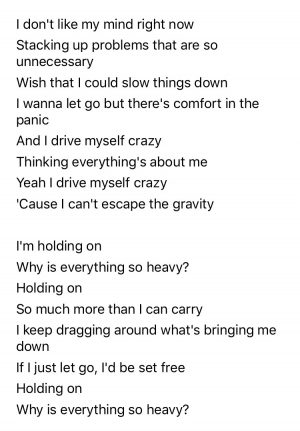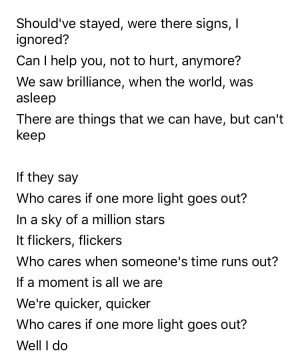“One More Light” was a cry for help that everyone missed
In the early 2000s, LINKIN PARK was one of the most prominent alternative-rock groups. Some of their most recognizable hits include “In the End” and “Numb.” Their unique balance of lyrical vocals, classic rock, and powerful melody is one few bands have been able to match.
However, last summer, it all ended. Lead singer Chester Bennington committed suicide at 41 years of age, leaving behind a wife and six children. He said he had a rough childhood that led to drug and alcohol abuse for much of his life, and in the end he couldn’t bear the load. His death came as a tragic shock to the entertainment industry as well as many outsiders like me and you.
This might be a conspiracy because I have no inside information whatsoever on Bennington or his life, but looking back, LINKIN PARK’s final album, “One More Light,” was Bennington’s suicide note to the world. It was a cry for help, and someone should have noticed.
Music reflects how people feel and that’s what makes it so good. The easiest example is Taylor Swift. She has the reputation of making songs only about getting together with a boy or breaking up with one – and there’s a clear distinction in styles. When she talks about a good relationship, it’s a happy, upbeat tone. In a bad one, it’s a darker, minor feel. Every good musician does this one way or another. Music connects people to ideas, and many times the singer’s feelings connect to their audience.
The early LINKIN PARK songs were known for being wild. There would be screaming one moments, then gentle commentary, and usually a lyrical part. “One More Light” isn’t that at all. Apple Music describes it in their summary as “showing their maturity, tackling complex issues of uncertainty, regret, and life’s changes.” It’s a very somber melancholy album, which is big evidence of my theory.
First of all, Bennington is pretty much the only one singing. The old LINKIN PARK has both Bennington and Mike Shinoda as compliments, but in “One More Light,” Bennington is singing for most of the time.
In terms of the songs, the titles have hints, but the lyrics told the stories. In “Heavy,” he asks “why is everything so heavy?” and talks about all the emotional weight he carries. One big part of the chorus “if I just let go I’ll be set free.” “Battle Symphony,” “Good Goodbye”, and “Sorry” are names of songs that would seem to be reflecting on life and preparing for the ultimate end.


In addition, the album name itself gives this message. The name “One More Light” drops a massive hint that it’s the final work of the band. The album name is also a name of a song, and that song has an incredibly pessimistic tone. As a matter of fact, that song first put this idea in my head.
What does this all mean? The album acted like a suicide note for Bennington. He reflects on the lessons he learned over his career and apologizes a lot – probably to his family. The album dropped on May 19, 2017.
Bennington died almost exactly 2 months later on July 20, 2017 – this can’t be a coincidence.
One common suicide warning sign is in the end when the person seems almost content with letting go. After battling inner trauma for a lengthy period of time, when they make the decision to end it, they are often at peace. It seems that after a lifetime of fluctuation and wild events, Bennington put it all together into ten songs to describe his feelings as he left this world.
I can’t speak for what happened in the home stretch of Bennington’s life, but the signs were there. There’s no information detailing if he seeked help or counseling, but his life ended too early, and it could have been prevented. Let the lesson be that people aren’t perfect in nature, but there is enough good in people to help those who struggle. If we look for the warning signs, suicide is a preventable matter.






Anonymous • Oct 9, 2018 at 12:40 pm
literally his entire career was a cry for help. have you heard anything else?